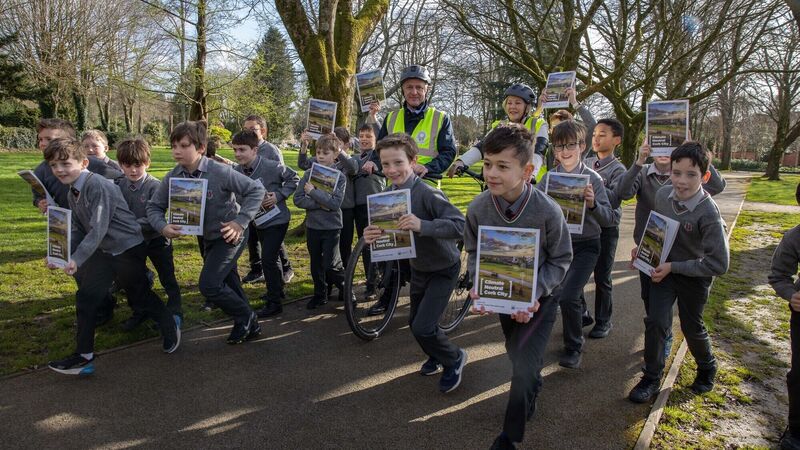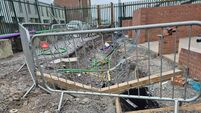Council's climate plan will see investment of more than €2.2bn in green initiatives in Cork city

Chief Executive Cork City Council, Ann Doherty, Director of Strategic and Economic Development, Cork City Council, Fearghal Reidy and pupils of St. Joseph’s NS officially launched Cork City Council’s Local Authority Climate Action Plan 2024- 2029, Climate Neutral Cork City, in Fitzgerald’s Park, Cork.
The plan, which councillors voted to adopt last month and which was officially published yesterday, came after extensive engagement and consultation.
The largest sum in the plan’s headline expenditure between now and 2029 will be €1.9bn on housing, which the council says will see the provision of high-quality homes with a minimum BER (building energy rating) of A2.
A further €190m will be spent on the Cork Docklands, which the plan states will create “a new liveable, walkable, and welcoming community right in the city centre”.
Spending of €134m on walking and cycling facilities will include the Marina Promenade upgrade and Phase 2 of the Marina Park project. Some €5.5m will go to the design and planning phase of the Northwest Regional Park.
The plan states an intention to “establish a community leadership development programme to build the knowledge, confidence, and capacity of community groups to initiate local climate action”.
Cork City Council has said its new Climate Action Plan, the first such produced for the city, combines actions to reduce, or mitigate, greenhouse gas emissions, and to adapt to the climate changes already underway.
In drafting the plan, the council engaged with over 1,100 citizens, and received submissions from residents, community groups and businesses as well as regional and national bodies.
The Lord Mayor of Cork, Kieran McCarthy, said the plan was the council’s direct response to the climate and biodiversity emergency declared in the city in 2019.
“As a city, we are also demonstrating our ambition by actively participating in the EU 100 Climate-Neutral and Smart Cities Mission to accelerate our journey to climate neutrality and place Cork at the forefront of climate action,” Mr McCarthy said.
“To succeed we must all work together. Business as usual is no longer enough”.
Green Party councillor Oliver Moran, chair of the council’s Climate Action Committee, said the plan committed to investment of €2.5 billion over the next five years, as part of a wider €10 billion pipeline, excluding health and education, over the next 10 years.
He noted that a significant amendment was made in response to the public consultation and engagement with his committee.
“Initially, a key performance indicator for implementation of the plan was merely the number of actions implemented. That was to be measured through minutes of meetings, regardless of real-world outcomes,” he explained.
“This has been replaced with the much more stark and real-world calculation of the total greenhouse gas emissions per annum by sector in the city.”
Fianna Fáil councillor Seán Martin described the plan as “proactive and progressive”, saying the formation of the council’s Climate Action Committee five years ago had been “a very good step”.
“Investing €1.9 billion in the provision of high-quality homes shows the council’s commitment to a better future for our city,” he said.
Sinn Féin councillor Orla O’Leary said the plan was “fantastic”, adding that the consultation process had been extremely good.
“I do think that one thing that was very clear in the submissions was that we actually need greater ambition for climate action in our city and in what we do,” she said.
“I do think from the submissions that we do need to encourage more climate-positive behaviour.” Rabharta councillor Lorna Bogue dismissed the plan as “a greenwashed manifesto for business as usual”.
Ms Bogue, a former Green Party member, said climate action plans should be measured first on how much carbon they reduce and secondarily on how long they takes to reduce carbon emissions.
“On both counts this climate action plan is far from ambitious,” she said.
“A substantial portion of the €1.9 billion for housing over five years is being spent on deep retrofit for relatively few houses as opposed to measures such as basic insulation and central heating upgrades for the majority of homes in need of them.
“The figures might look impressive at first glance, but this climate plan dresses up eco-austerity as investment.
“There is no new money coming in for this. It benefits very few people in comparison with what could have been done,” she said.







 App?
App?


